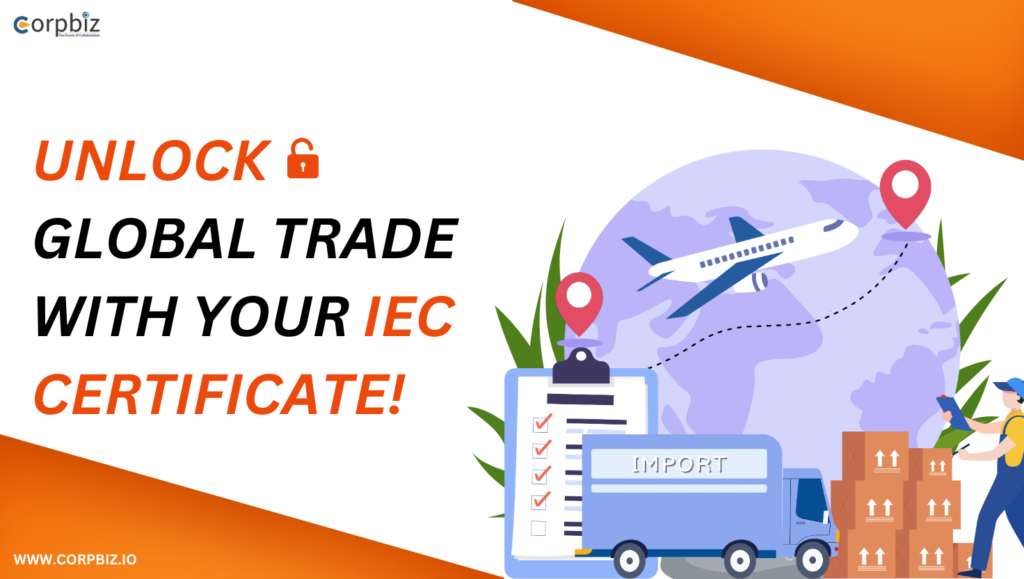In today’s competitive global market, businesses are continuously looking for ways to expand and thrive. For Indian entrepreneurs, exporting products to international markets presents a massive opportunity to scale their businesses. However, exporting is not as simple as it sounds. To export products legally from India, one must navigate through several regulatory requirements. One of the most crucial steps for any Indian exporter is obtaining an Importer Exporter Code (IEC) certificate.
The IEC certificate acts as a gateway for Indian businesses to enter the global market. This unique 10-digit code issued by the Director General of Foreign Trade (DGFT) under the Ministry of Commerce and Industry is mandatory for any business involved in importing or exporting goods and services. Let’s explore how an IEC certificate impacts your export strategy and why it is essential for your business.
How an IEC Certificate Impacts Your Export Strategy:
-
Unlocking International Markets
The first and most significant impact of an IEC certificate on your export strategy is that it allows you to export goods legally from India. Without this certification, no business can engage in cross-border trade. Whether you’re an individual exporter or a large business, obtaining an IEC registration is the initial step to accessing global markets.
Moreover, the IEC certificate is not limited to large corporations but is also essential for small and medium-sized enterprises (SMEs) looking to expand their footprint in international markets. By securing the necessary documentation, businesses of all sizes can export their products, ensuring they meet compliance standards.
-
Simplifying Compliance and Reducing Legal Risks
In India, compliance with export laws is crucial for running a successful export business. The IEC certificate streamlines compliance processes and ensures that you meet all the legal requirements to conduct international trade.
When it comes to exporting agricultural products, the APEDA registration certificate is also essential. This certification, governed by the Agricultural and Processed Food Products Export Development Authority (APEDA), is mandatory for businesses dealing in specific agricultural goods. Together, the IEC certificate and APEDA Export License ensure that businesses follow Indian guidelines and global standards, reducing the risk of legal disputes and penalties.
With these certifications in place, exporters can navigate the complexities of the trade process while ensuring their products meet the necessary health, safety, and quality standards.
-
Building Credibility and Trust with Global Clients
Global clients often look for credible business partners. An IEC certificate is an indicator that your business is legally registered and authorized to conduct international trade. This builds confidence with foreign buyers and boosts your credibility in global markets.
Additionally, for businesses involved in the export of chemical products, minerals, and other similar commodities, the CAPEXIL certificate is crucial. CAPEXIL, an export promotion council under the Ministry of Commerce, plays a vital role in promoting the export of a wide range of products from India. CAPEXIL Registration ensures that businesses are recognized by government bodies and have the necessary authorization to export their products. This not only adds to the company’s reputation but also opens doors to international markets where such registrations are mandatory.
-
Access to Export Incentives and Government Schemes
One of the lesser-known but significant impacts of having an IEC certificate is the access it grants to various export incentives and government schemes. The Indian government provides several export benefits, such as duty exemptions, subsidies, and tax reliefs, to promote exports and reduce the cost of conducting international trade.
For example, businesses holding an APEDA export license can take advantage of subsidies and financial assistance related to the export of agricultural products. Similarly, exporters of non-agricultural products can benefit from the incentives offered through CAPEXIL registration.
These government-backed schemes help reduce overall operational costs, giving your business a competitive edge in international markets.
-
Enabling Smooth Customs Clearance and Hassle-Free Banking
Customs clearance is an essential part of the export process, and having an IEC certificate simplifies this procedure. With a valid IEC registration, exporters can complete their customs formalities efficiently, ensuring the smooth movement of goods across borders.
Additionally, the IEC certificate is linked to various financial transactions. It is necessary to open an export-import bank account, obtain foreign currency loans, and receive payments from foreign clients. Without an IEC certificate, conducting international financial transactions becomes a challenge, which could hinder your business’s growth in the global market.
-
Diversifying Your Product Range
The scope of your export strategy can be expanded through multiple product lines. By obtaining various certifications, such as APEDA registration for agricultural goods and CAPEXIL registration for non-agricultural items, you can diversify your business and explore new opportunities across different sectors.
For instance, an exporter dealing in both agricultural and mineral products could benefit from the combined advantages of APEDA and CAPEXIL certifications, maximizing the range of goods that can be legally exported to international markets. This diversification is not only financially beneficial but also helps businesses navigate through market fluctuations by spreading risk across different product categories.
-
Compliance with International Standards
Exporting products globally requires adherence to strict quality and safety standards. Certifications like the APEDA registration certificate and CAPEXIL certificate ensure that your products comply with the respective international standards and regulations, making them more competitive in the global market.
For instance, businesses dealing in agricultural products need to meet the guidelines set by importing countries regarding packaging, labeling, and food safety. The APEDA export license ensures that your business meets these global quality standards, making your products more appealing to international buyers.
-
Expanding Network and Market Opportunities
Lastly, having an IEC Certificate and other relevant export certifications connects businesses with various export promotion councils, trade fairs, and global networking opportunities. These platforms help businesses to expand their reach, connect with international buyers, and explore new market segments.
For example, exporters registered with CAPEXIL can take part in trade missions, exhibitions, and buyer-seller meets that are organized globally. These initiatives help businesses identify potential markets and expand their export activities, further enhancing their export strategy.
FAQs
-
Is it mandatory to have both an IEC certificate and an APEDA registration to export agricultural products?
Yes, if your business involves exporting specific agricultural products from India, it is mandatory to have both an IEC certificate and an APEDA registration certificate. The IEC certificate is essential for any import or export activity, while the APEDA license is required for exporting agricultural goods.
-
What are the benefits of obtaining a CAPEXIL certificate for my export business?
The CAPEXIL certificate offers several benefits, such as increased credibility, access to government schemes, participation in global trade fairs, and networking opportunities. It is especially useful for businesses dealing in chemicals, minerals, and other similar products.
-
How long does it take to get an IEC certificate in India?
The process of obtaining an IEC certificate typically takes 3-7 working days, provided all the required documents are submitted correctly and there are no discrepancies in the application.

